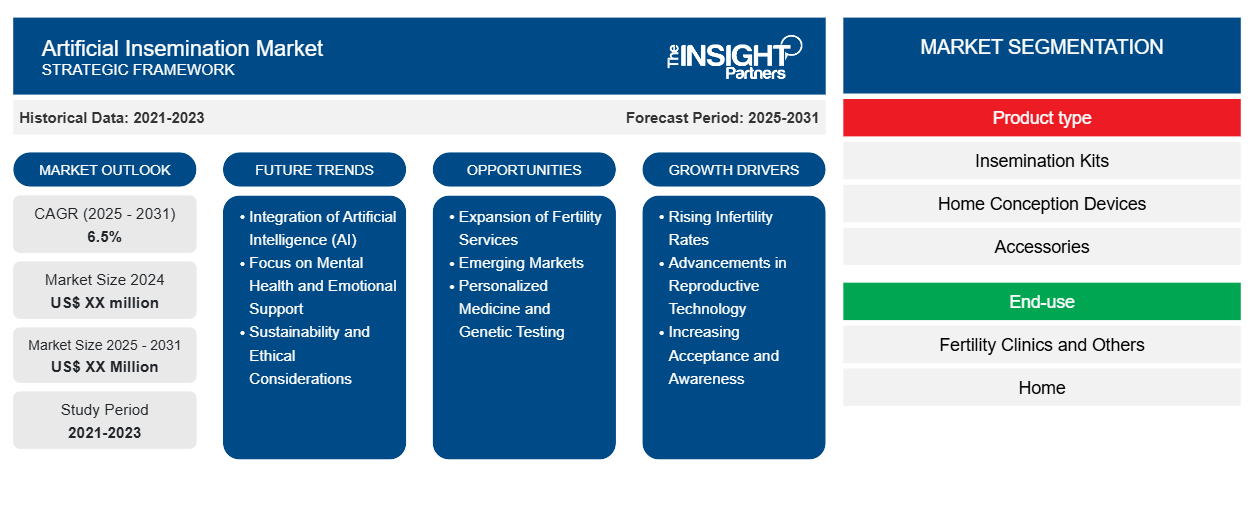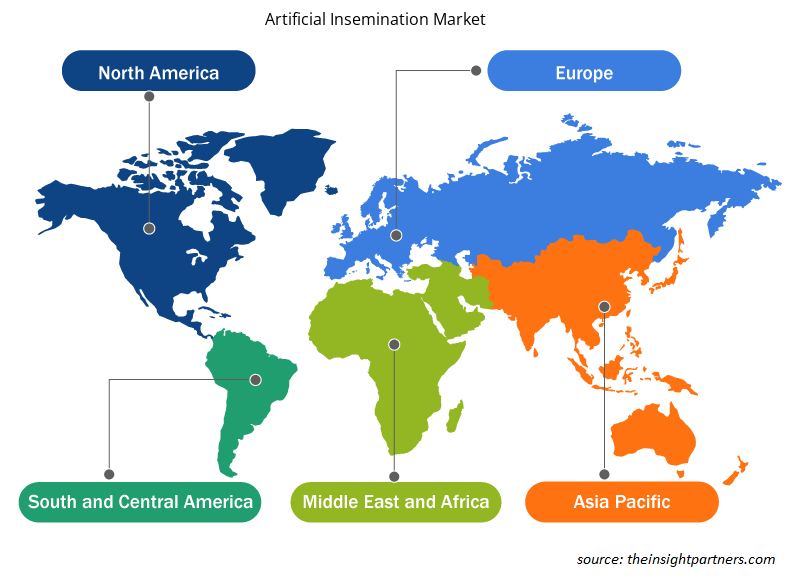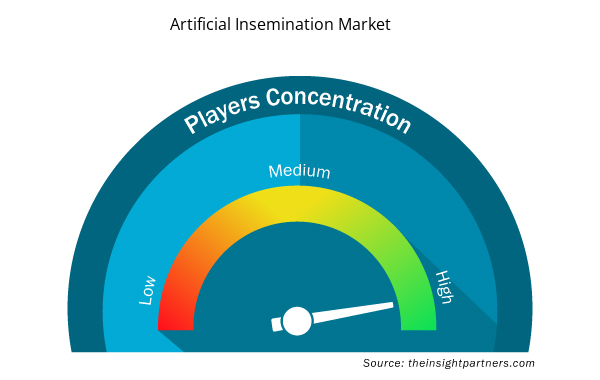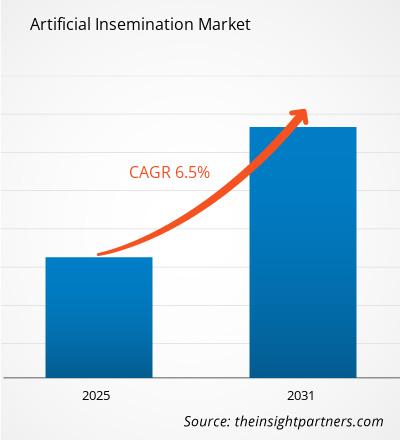The Artificial Insemination Market is expected to register a CAGR of 6.5% from 2025 to 2031, with a market size expanding from US$ XX million in 2024 to US$ XX Million by 2031.
The report is segmented by Product type (Insemination Kits, Home Conception Devices, Accessories). The report further presents analysis based on the End-use (Fertility Clinics and Others, Home). The report is segmented by Source Type (AIH - Husband, AID - Donor). The report is segmented by Technique (Intrauterine Insemination, Intracervical Insemination, Intravaginal Insemination Intratubal Insemination, Intratubal Insemination). The global analysis is further broken-down at regional level and major countries. The Report Offers the Value in USD for the above analysis and segments.
Purpose of the Report
The report Artificial Insemination Market by The Insight Partners aims to describe the present landscape and future growth, top driving factors, challenges, and opportunities. This will provide insights to various business stakeholders, such as:
- Technology Providers/Manufacturers: To understand the evolving market dynamics and know the potential growth opportunities, enabling them to make informed strategic decisions.
- Investors: To conduct a comprehensive trend analysis regarding the market growth rate, market financial projections, and opportunities that exist across the value chain.
- Regulatory bodies: To regulate policies and police activities in the market with the aim of minimizing abuse, preserving investor trust and confidence, and upholding the integrity and stability of the market.
Artificial Insemination Market Segmentation
Product type
- Insemination Kits
- Home Conception Devices
- Accessories
End-use
- Fertility Clinics and Others
- Home
Source Type
- AIH - Husband
- AID - Donor
Technique
- Intrauterine Insemination
- Intracervical Insemination
- Intravaginal Insemination Intratubal Insemination
- Intratubal Insemination
Customize This Report To Suit Your Requirement
You will get customization on any report - free of charge - including parts of this report, or country-level analysis, Excel Data pack, as well as avail great offers and discounts for start-ups & universities
Artificial Insemination Market: Strategic Insights

- Get Top Key Market Trends of this report.This FREE sample will include data analysis, ranging from market trends to estimates and forecasts.
Artificial Insemination Market Growth Drivers
- Rising Infertility Rates: The rising prevalence of infertility among couples globally has become a significant driver for the artificial insemination market. Changes in lifestyle, environmental influence, and delayed childbearing have been involved in increased infertility cases around the globe. The World Health Organization estimated that approximately 15 percent of couples are afflicted by this condition. Ever-increasing use for assisted reproductive technologies encourages healthcare organizations to adopt and expand these services.
- Advancements in Reproductive Technology: Changes in technology have made artificial insemination much more efficient and successful. With respect to semen preservation, examples include cryopreservation, whereby sperm can be stored for long periods of time. Thus, both human and veterinary applications can access the stored sperm more easily. Changes in diagnostic technologies, such as ultrasound and hormone profiling, also mean that inseminations are better timed, resulting in increased success rates. Both human fertility clinics and livestock breeding programmes constitute key market factors driving demand.
- Increasing Acceptance and Awareness: There has been some fundamental shift in the social attitudes towards assisted reproductive technology. It is clearly perceivable that many are now willing to seek help with their infertility as a result of awareness among the people concerning the issues related to infertility. Due to the number of celebrity stories and efforts of various organizations that aimed to clarify the misconception about infertility, it has de-stigmatized this condition and a wide extent portrayed the benefits of artificial insemination. This is also due to the education resources that have enabled the potential patient to understand their options much better. The ever-widening knowledge and also the acceptability levels are among the major reasons driving the artificial insemination market.
Artificial Insemination Market Future Trends
- Integration of Artificial Intelligence (AI): The integration of artificial intelligence in the human artificial insemination market is thus an emerging trend that is promising for better patient outcomes. AI can analyze large datasets, finding patterns that may predict success rates based on certain fertility treatments. Sperm selection processes are improved, and insemination is optimized in terms of timing by machine learning algorithms, hence results will be enhanced. Additionally, AI-based platforms would assist the providers of health care in patient data management, streamlining operations, and providing individualized treatment plans, hence boosting the effectiveness of fertility clinics.
- Focus on Mental Health and Emotional Support: Infertility involves an emotional and psychological context for many people, and thus psychologic support is being increasingly focused within fertility treatments. Many couples who are infertile face disappointment, depression, and anxiety due to the failure they experience in conceiving. Slowly, mental health has been incorporated into fertility clinics mainly through counseling and support groups. Such steps are changing the face of fertility treatment both by offering emotional relief to patients and thereby improving the overall experience of treatment, which goes towards better results and patient satisfaction.
- Sustainability and Ethical Considerations: In alignment with the shift toward sustainability in healthcare systems, artificial insemination also undergoes a shift toward ethical and ecological approaches. The adoption of eco-friendly clinical protocols also reduces waste and uses materials that are considered more sustainable while being concurrent with responsible handling and storage of gametes. Another imperative in the scenario includes the contentious issues surrounding the anonymity of the donors along with the ethics of reproductive technologies. The process of selection should be transparent as well as by adhering to all the guidelines laid down by ethics in order to maintain trust and integrity in the field of artificial insemination.
Artificial Insemination Market Opportunities
- Expansion of Fertility Services: The artificial insemination market has created a lot of options for the expansion of fertility services. Most clinics now provide comprehensive packages inclusive of counseling, fertility testing, and tailored treatment plans. Such comprehensive services enhance the capability of clinics to tackle a range of patient issues while raising their results in a more significant extent. Additionally, complementary services such as nutrition counseling, stress management, and mental health support can enhance patient results with better access to the market.
- Emerging Markets: The demand for artificial insemination services is increasing, especially among emerging markets. With improving economic conditions and increased awareness about reproductive health, new opportunities are expected from the Asian-Pacific, Latin American, and African countries. Improvements in healthcare infrastructure in these markets are leading to considerable investment by governments and private organizations, thus giving fertile ground for fertility clinics to set up shops. Entering such markets then creates avenues for companies to reap from the now increasing demand for reproductive health care and contribute immensely to total and global growth of artificial insemination.
- Personalized Medicine and Genetic Testing: This increased trend in personalized medicine is also being used for the first time in reproductive health, bringing innovation to the artificial insemination market. Genetic testing and having a specific treatment plan by tailoring interventions based on an individual patient profile can significantly improve rates of success. An example is identifying genetic disorders before conception to make informed decisions related to the options that couples have for reproduction. The fertility clinics can now utilize the technology to attract the patients and provide more personalized solutions as genetic testing continues to become accessible and affordable.
Artificial Insemination Market Regional Insights
The regional trends and factors influencing the Artificial Insemination Market throughout the forecast period have been thoroughly explained by the analysts at Insight Partners. This section also discusses Artificial Insemination Market segments and geography across North America, Europe, Asia Pacific, Middle East and Africa, and South and Central America.

- Get the Regional Specific Data for Artificial Insemination Market
Artificial Insemination Market Report Scope
| Report Attribute | Details |
|---|---|
| Market size in 2024 | US$ XX million |
| Market Size by 2031 | US$ XX Million |
| Global CAGR (2025 - 2031) | 6.5% |
| Historical Data | 2021-2023 |
| Forecast period | 2025-2031 |
| Segments Covered |
By Product type
|
| Regions and Countries Covered | North America
|
| Market leaders and key company profiles |
Artificial Insemination Market Players Density: Understanding Its Impact on Business Dynamics
The Artificial Insemination Market market is growing rapidly, driven by increasing end-user demand due to factors such as evolving consumer preferences, technological advancements, and greater awareness of the product's benefits. As demand rises, businesses are expanding their offerings, innovating to meet consumer needs, and capitalizing on emerging trends, which further fuels market growth.
Market players density refers to the distribution of firms or companies operating within a particular market or industry. It indicates how many competitors (market players) are present in a given market space relative to its size or total market value.
Major Companies operating in the Artificial Insemination Market are:
- Nikon Instruments Inc.
- Genea Limited
- Rinovum Women's Health LLC
- Pride Angel
- Hi-Tech Solutions
Disclaimer: The companies listed above are not ranked in any particular order.

- Get the Artificial Insemination Market top key players overview
Key Selling Points
- Comprehensive Coverage: The report comprehensively covers the analysis of products, services, types, and end users of the Artificial Insemination Market, providing a holistic landscape.
- Expert Analysis: The report is compiled based on the in-depth understanding of industry experts and analysts.
- Up-to-date Information: The report assures business relevance due to its coverage of recent information and data trends.
- Customization Options: This report can be customized to cater to specific client requirements and suit the business strategies aptly.
The research report on the Artificial Insemination Market can, therefore, help spearhead the trail of decoding and understanding the industry scenario and growth prospects. Although there can be a few valid concerns, the overall benefits of this report tend to outweigh the disadvantages.
- Historical Analysis (2 Years), Base Year, Forecast (7 Years) with CAGR
- PEST and SWOT Analysis
- Market Size Value / Volume - Global, Regional, Country
- Industry and Competitive Landscape
- Excel Dataset


- Queue Management System Market
- Fertilizer Additives Market
- Nuclear Decommissioning Services Market
- Clinical Trial Supplies Market
- Dried Blueberry Market
- Medical and Research Grade Collagen Market
- Flexible Garden Hoses Market
- Molecular Diagnostics Market
- Oxy-fuel Combustion Technology Market
- Toothpaste Market

Report Coverage
Revenue forecast, Company Analysis, Industry landscape, Growth factors, and Trends

Segment Covered
This text is related
to segments covered.

Regional Scope
North America, Europe, Asia Pacific, Middle East & Africa, South & Central America

Country Scope
This text is related
to country scope.
Frequently Asked Questions
The Artificial Insemination Market is estimated to witness a CAGR of 6.5% from 2023 to 2031
The major factors driving the Artificial Insemination market are:
1. Rising Infertility Rates
2.Advancements in Reproductive Technology
Expansion of Fertility Services act as a opportunity for growth of the market in forecast period.
North America region dominated the Artificial Insemination market in 2023.
Insemination Kits segment, by product type, dominated the market in 2023.
Players operating in the market are Nikon Instruments Inc., Genea Limited, Rinovum Women's Health LLC, Pride Angel, Hi-Tech Solutions, Irvine Scientific, Kitazato Corporation, Clearblue (SPD Swiss Precision Diagnostics GmbH), Rocket Medical PLC, Conceivex Inc.
Trends and growth analysis reports related to Life Sciences : READ MORE..
The List of Companies
1. Nikon Instruments Inc.
2. Genea Limited
3. Rinovum Women's Health LLC
4. Pride Angel
5. Hi-Tech Solutions
6. Irvine Scientific
7. Kitazato Corporation
8. Clearblue (SPD Swiss Precision Diagnostics GmbH)
9. Rocket Medical PLC
10. Conceivex, Inc.

 Get Free Sample For
Get Free Sample For